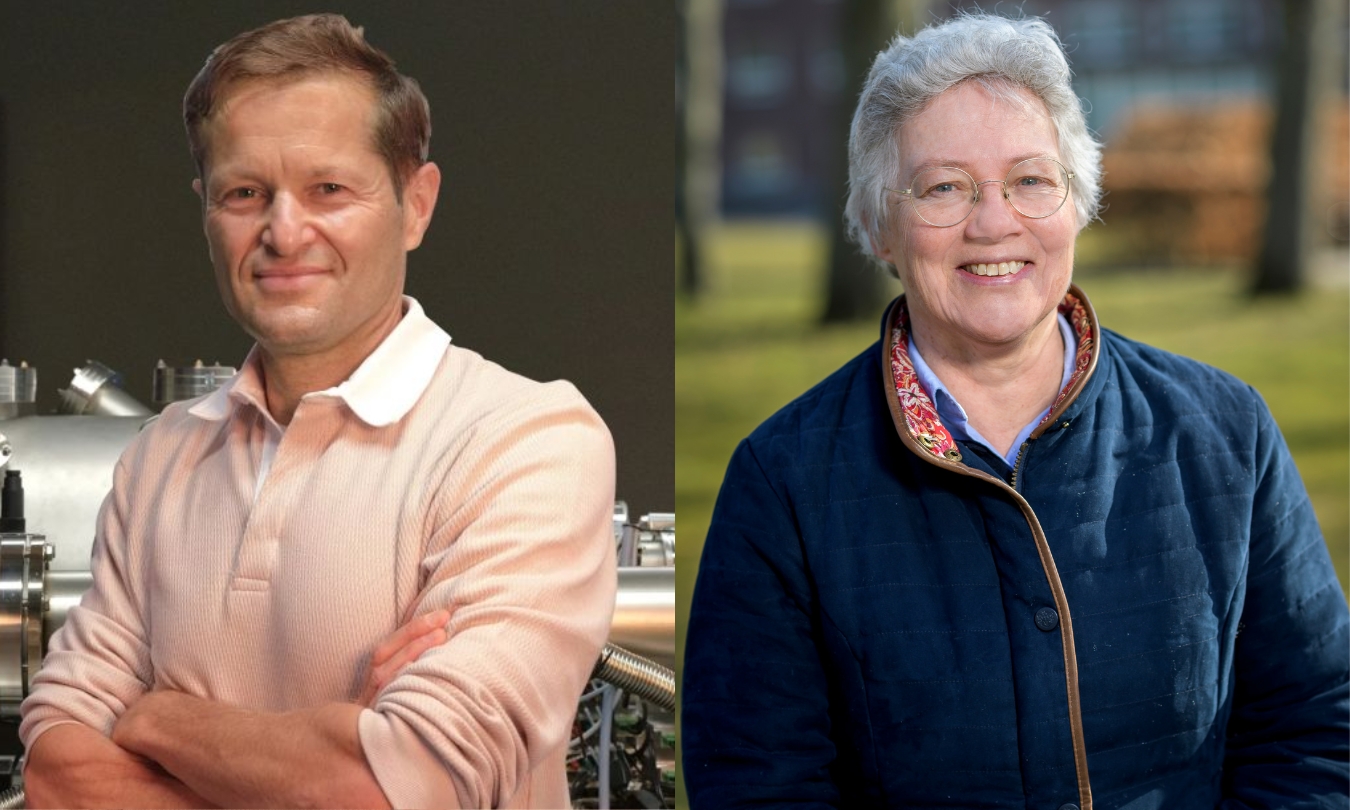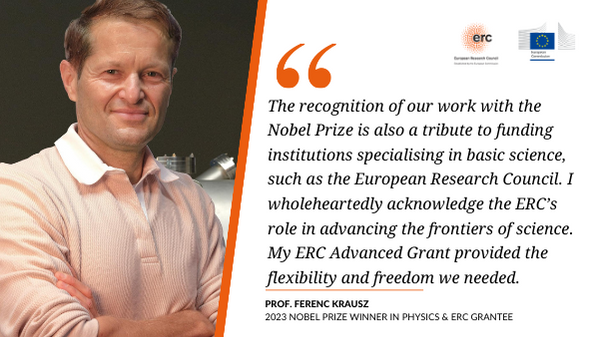
Ferenc Krausz and Anne L’Huillier, funded by the European Research Council (ERC), have today been awarded the 2023 Nobel Prize in Physics. They won the prize together with Pierre Agostini for “experimental methods that generate attosecond pulses of light for the study of electron dynamics in matter”. This brings the number of ERC grantees who have won a Nobel Prize up to fourteen. The ERC has backed the pioneering frontier research of Professors Krausz and L’Huillier with four major individual grants, worth nearly €9.5 million.
Iliana Ivanova, Commissioner for Innovation, Research, Culture, Education and Youth, said: “Congratulations to this year’s laureates of the Nobel Prize in physics! I am really proud that the European Research Council has substantially funded these outstanding scientists in their revolutionary research. They have also been supported via numerous other EU research and innovation programmes, in particular Marie Skłodowska-Curie Actions. This showcases the importance of funding eminent researchers and giving them the resources they need to succeed in their scientific endeavours to the benefit of humankind.”
ERC President Prof. Maria Leptin commented: “We congratulate the new laureates on their Nobel Prize! This is the highest recognition of their scientific excellence. As Ferenc Krausz and Anne L’Huillier have been funded by the European Research Council, it is a very happy day for us too. This shines a light on the outstanding talent hosted in Europe and on the need for the EU to keep investing in the best free fundamental research that is cutting new ground.”
Anne L’Huillier is a Swedish-French physicist and professor of atomic physics at Lund University, Sweden. She has been backed over the past 15 years with three ERC Advanced Grants (2008, 2013 and 2019) and three top up grants, Proof of Concept (2013, 2017, 2023), worth in total €7.1 million. She is working on the interaction between short and intense laser pulses and atoms. Professor L’Huillier’s research has advanced the understanding of the dynamics of electrons within atomic systems. In parallel, her discoveries in the field of ultrafast laser technology have opened up further scientific - as well as commercial - opportunities in this field.
Ferenc Krausz is a Hungarian-Austrian physicist at the Max Planck Institute of Quantum Optics and the Ludwig Maximilian University of Munich, Germany. He was funded with an ERC Advanced Grants of €2.5 million in 2009 to carry out a five-year research project on “4D imaging of fundamental processes on the atomic and sub-atomic scale”. He and his research team were the first to generate and measure attosecond light pulses and used them to capture electron motion inside atoms.
These two ERC grantees also won the Wolf Prize together. They have previously also taken part in several joint EU-funded research projects.
Background
Today's award follows that of twelve other ERC grantees:
- Prof. Konstantin Novoselov was the first ERC grantee to receive a Nobel Prize in Physics for his work on graphene. He held a Starting Grant and in 2010 was amongst the youngest Nobel prize winners in history. See ERC press release
- Prof. Serge Haroche, ERC Advanced Grant holder, was awarded the 2012 Nobel Prize in Physics for ground-breaking experimental methods that enable measuring and manipulation of individual quantum systems. See ERC press release
- Professors Edvard I. Moser and May-Britt Moser, both ERC Advanced Grant holders, received the 2014 Nobel Prize in Physiology or Medicine for their discoveries of cells that constitute a positioning system in the brain. See ERC press release
- Prof. Jean Tirole, ERC Advanced Grant holder, received the 2014 Sveriges Riksbank Prize in Economic Sciences in Memory of Alfred Nobel for his work on examining competition, analysing how large companies should be regulated to prevent monopoly behaviour and protect consumers. See ERC press release
- Prof. Bernard Feringa, ERC Advanced Grant holder, received the 2016 Nobel Prize in Chemistry for the design and synthesis of molecular machines. See ERC press release
- Prof. Peter J. Ratcliffe, ERC Advanced Grant holder, received the 2016 Nobel Prize in Physiology or Medicine “for their discoveries of how cells sense and adapt to oxygen availability.” See ERC press release
- Prof. Giorgio Parisi, two-fold ERC Advanced Grant holder and funded for a decade, received the 2021 Nobel Prize in Physics “for ground-breaking contributions to our understanding of complex physical systems.” See ERC press release
- Prof. Benjamin List, two-fold ERC Advanced Grant holder and funded for a decade, won the 2021 Nobel Prize in Chemistry “for the development of asymmetric organocatalysis”. See ERC press release
- Prof. Svante Pääbo, two-fold Advanced Grant holder, received the 2022 Nobel Prize in Physiology or Medicine for “his discoveries concerning the genomes of extinct hominins and human evolution.” See ERC press release
- Professors Alain Aspect and Anton Zeilinger, both Advanced Grant holders, share the 2022 Nobel Prize in Physics “for experiments with entangled photons, establishing the violation of Bell inequalities and pioneering quantum information science.” See ERC press release
In addition, the ERC has funded several researchers who were already Nobel Prize laureates when they won their ERC grants.
About the ERC
The ERC, set up by the European Union in 2007, is the premier European funding organisation for excellent frontier research. It funds creative researchers of any nationality and age, to run projects based across Europe. The ERC offers four core grant schemes: Starting Grants, Consolidator Grants, Advanced Grants and Synergy Grants. With its additional Proof of Concept Grant scheme, the ERC helps grantees to bridge the gap between their pioneering research and early phases of its commercialisation. The ERC is led by an independent governing body, the Scientific Council. Since November 2021, Maria Leptin is the President of the ERC. The overall ERC budget from 2021 to 2027 is more than €16 billion, as part of the Horizon Europe programme, under the responsibility of European Commissioner for Innovation, Research, Culture, Education and Youth, Iliana Ivanova.

.png)




